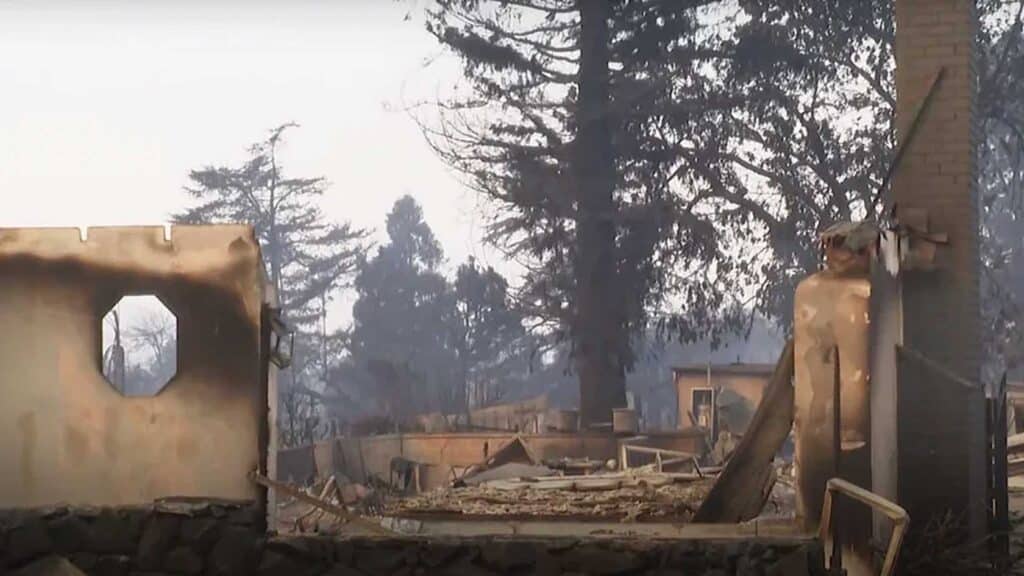
As the rapidly spreading Eaton wildfire in Los Angeles crept closer to the home he’d lived in for nearly six decades, Rodney Nickerson, 83, wasn’t going to panic. Despite the pleas of his worried daughter and anxious neighbors, he was staying put.
It made sense for him to hold on: He bought the house in 1968, when it wasn’t easy for Black people to own property in L.A., much less in a great neighborhood like Altadena. To Nickerson, a retired engineer who clocked in at Lockheed-Martin for almost half a century, there was no reason to panic. He would ride it out.
“He said, ‘I’ll be fine,’” his daughter, Kimko Nickerson, told a reporter for KCAL, a local TV news station. “He said, ‘I’ll be here when you come back and the house will be here.’”
Tragically, he miscalculated. When she returned to the house, Kimko Nickerson found her father’s body in the charred, smoldering ruins.
For the sixth day, firefighters continued to battle a series of deadly wildfires sweeping through portions of Los Angeles, killing at least 10 people, consuming thousands of homes and displacing some 180,000 people. Although headlines about the fire’s human toll have centered on celebrities like Billy Crystal and Mel Gibson burned out of posh homes, the blaze destroyed Altadena, a Black, upper-middle-class enclave, and stories like Nickerson’s don’t get much attention.
Moreover, Altadena was one of the few places Black people could purchase homes in metro Los Angeles because the area was exempt from redlining. Over time, the neighborhood transformed from a segregated enclave to an oasis for Black homeowners: 2 in 10 residents are Black, and a sizable portion of them own property.
Indeed, most of the Black Angelenos hit hard by the fire bought in the well-regarded neighborhood to build generational wealth for their families. Like Nickerson, some had paid off their homes; others, however, were uninsured — the result of insurance companies pulling out of California due in part to excessive fire risk.
As a result, families who lost homes, clothing and all their possessions are essentially on their own, with next to no financial help to rebuild their lives.
“The Altadena fire is even sadder knowing it’s one of the only areas in that part of LA county with a historic & large Black community,” one user wrote on X.
Recognizing that problem, community activists in Los Angeles set up a GoFundMe page and spreadsheet to collect money specifically for Altadena families who need help. By Friday evening, there were 112 families on the list.
Meanwhile, on Black social media, users took to various platforms to push back against right-wing narratives that fire victims didn’t deserve compassion or sympathy. They believe that Angelenos who could afford to live in neighborhoods like Altadena brought the disaster on themselves and probably don’t need the help to get on their feet.
In reality, some victims lived in multigenerational households, others had known no other home, and still others held onto their property because they couldn’t afford to live anywhere else if they sold.
One user, @stallitan, wrote on X that it is “absolutely insane” for critics to take uninformed potshots when “hundreds of Black and minority communities lost their homes. Your anger lies with the US gvt NOT the innocent ppl that lost EVERYTHING.”
The NAACP’s Pasadena branch posted on Instagram an illustrated history of Altadena, including its founding by white settlers in the late 1800s and a second generation that kept out Black families. Eventually, though, the formerly segregated community included baseball legend Jackie Robinson, Black Panther Party leader Eldridge Cleaver and science fiction writer Octavia Butler as one-time residents.
The stress of losing everything was apparent in a video posted by Instagram user lacedbyleas, a Black woman. Standing in front of the blackened husk of her home — not much more than the concrete foundation, a chimney and a warped garage door — she put on a brave face, with a weak smile and throwing up deuces.
Then, moments later, she burst into tears: “We lived here our whole lives,” she sobbed.
Another older Black man — known around the neighborhood as Walt and filmed in an Instagram video posted by walkgoodla — didn’t pretend things were OK.
“I used to be a guy who had everything. I lost everything,” he said, his voice breaking as he wept. “I spent my whole life helping people. I didn’t think it would happen to me. But it did!”
Later in the video, Walt acknowledges “I have my life and my health,” so he is fortunate in that respect, he says. Still, the disaster hurts: “I’ve been knocked down before, but not like this.”
This story appeared in Word in Black.






